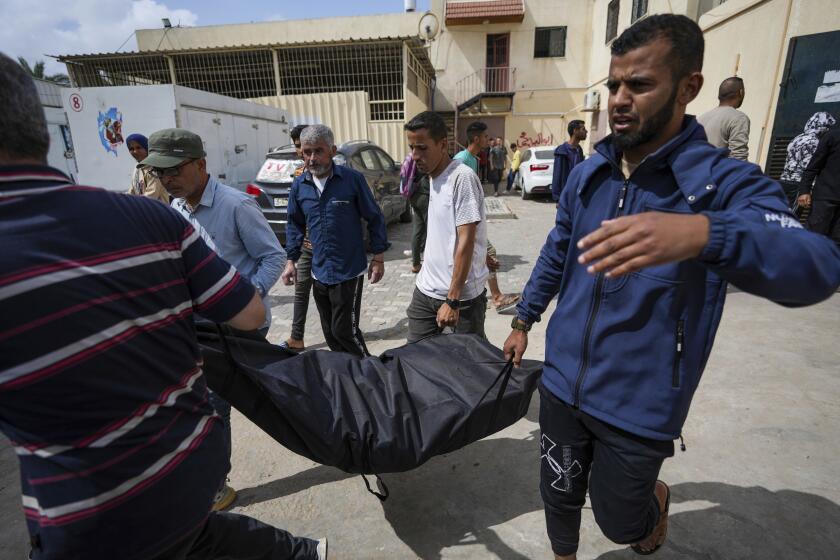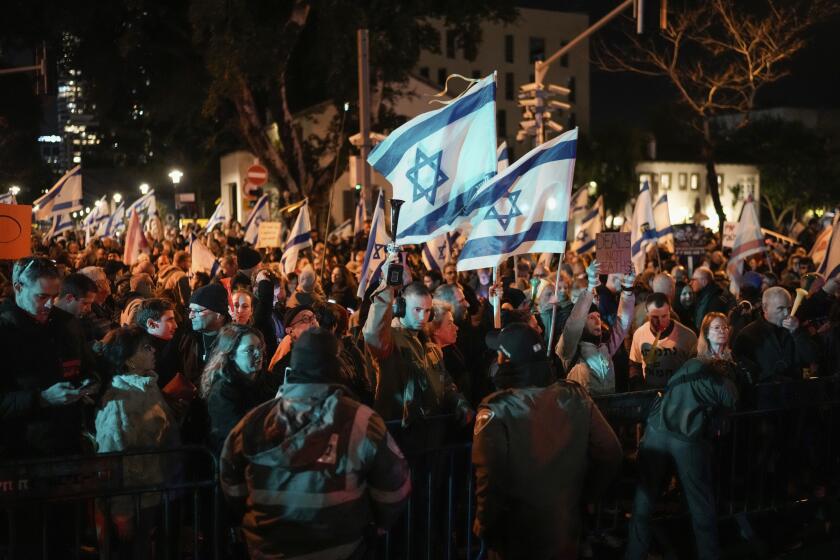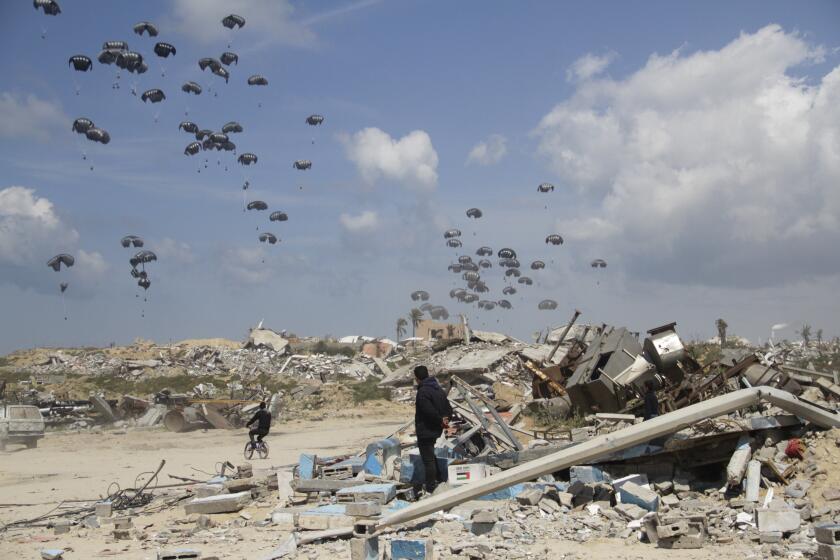Biden and Netanyahu speak as pressure grows on Israel over Rafah invasion

- Share via
TEL AVIV — The White House on Sunday said President Biden had again spoken with Israeli Prime Minister Benjamin Netanyahu as pressure builds on Israel and Hamas to reach a deal that would free some hostages and bring a cease-fire in the nearly seven-month war in Gaza.
The White House said Biden reiterated his “clear position” as Israel plans to invade Gaza’s southernmost city of Rafah despite global concern for the more than 1 million Palestinians sheltering there. The U.S. opposes the invasion on humanitarian grounds, straining relations between the allies.
U.S. Secretary of State Antony J. Blinken will visit Israel on Monday as part of a swing through Middle Eastern countries.
On the phone call, which lasted nearly an hour, Biden stressed that progress in the delivery of humanitarian aid to the Gaza Strip be “sustained and enhanced,” according to the statement. The two leaders agreed that the onus remains on Hamas to accept the latest offer in cease-fire negotiations, according to a U.S. official who was not authorized to comment publicly and spoke on condition of anonymity. There was no comment from Netanyahu’s office.
Meanwhile, a senior official from key intermediary Qatar urged Israel and Hamas to show “more commitment and more seriousness” in negotiations. Working alongside the U.S. and Egypt, Qatar was instrumental in negotiating a brief halt to the fighting in November that led to the release of dozens of hostages. But in a sign of frustration, Qatar, which hosts Hamas’ headquarters in Doha, this month said it was reassessing its role.
An Israeli delegation is expected in Egypt in the coming days to continue negotiations; senior Hamas official Basem Naim told the Associated Press that a delegation from the militant group will also head to Cairo. Egypt’s state-owned al-Qahera TV said the delegation would arrive Monday.
Hamas says it is reviewing a new Israeli proposal for a cease-fire in Gaza, as Egypt tries to stave off a planned Israeli ground offensive into Rafah.
In interviews with Israeli liberal daily Haaretz and public broadcaster Kan that were released Saturday evening, Qatar’s Foreign Ministry spokesperson Majed al-Ansari expressed disappointment with Hamas and Israel, saying each side has made decisions based on political interests and not with civilians’ welfare in mind.
He didn’t reveal details on the talks other than to say they have “effectively stopped,” with “both sides entrenched in their positions.”
Netanyahu and other politicians in Israel have criticized Qatar for not putting enough pressure on Hamas. Qatar has no formal diplomatic ties with Israel.
Al-Ansari’s remarks came after an Egyptian delegation discussed with Israeli officials a “new vision” for a prolonged cease-fire in Gaza, according to an Egyptian official who spoke on condition of anonymity to freely discuss developments.
The Egyptian official said Israeli officials are open to discussing a permanent cease-fire in Gaza as part of the second phase of a deal. Israel has refused to end the war until it defeats Hamas.
Egypt has sent a high-level delegation to Israel with the hope of brokering a cease-fire agreement between Hamas and Israel in the Gaza war.
The second phase would start after the release of civilian and sick hostages and would include negotiating the release of soldiers, the official added. Senior Palestinian prisoners would be released and a reconstruction process launched.
Negotiations this month centered on a six-week cease-fire proposal and the freeing of 40 civilian and sick hostages held by Hamas in exchange for the release of hundreds of Palestinian prisoners from Israeli jails.
A letter written by Biden and 17 other world leaders urged Hamas to release the hostages immediately. Hamas in recent days has released videos of three hostages, an apparent push for Israel to make concessions.
The growing pressure for a cease-fire deal is also meant to avert an Israeli attack on Rafah, the city on the border with Egypt. Israel has amassed dozens of tanks and armored vehicles.
Key mediator Qatar says talks on a potential cease-fire deal in Gaza ‘have not been progressing as expected’ in the last few days.
“Only a small strike is all it takes to force everyone to leave Palestine,” Palestinian Authority President Mahmoud Abbas asserted Sunday to the opening session of the World Economic Forum in Saudi Arabia, adding that he believed an invasion would happen within days.
But White House national security spokesman John Kirby told ABC that Israel “assured us they won’t go into Rafah until we’ve had a chance to really share our perspectives and concerns with them. So we’ll see where that goes.”
The Israeli troop buildup may be a pressure tactic on Hamas in talks. Israel, which has vowed to destroy Hamas’ military and governing capabilities, sees Rafah as the group’s last major stronghold.
Aid groups have warned that an invasion of Rafah would worsen the desperate humanitarian situation in Gaza, where hunger is widespread. About 400 tons of aid arrived Sunday at the Israeli port of Ashdod — the largest shipment yet by sea, via Cyprus — according to the United Arab Emirates. It wasn’t immediately clear how or when it would be delivered in Gaza.
As the war in Gaza grinds through a sixth month, each side has publicly insisted that its own idea of victory is within reach.
Also Sunday, World Central Kitchen said it would resume operations in Gaza on Monday, ending a four-week suspension after Israeli military drones killed seven of its aid workers. The organization has 276 trucks ready to enter through the Rafah crossing and will also send trucks into Gaza from Jordan, a statement said. The organization is examining if the Ashdod port can be used to offload supplies.
The war was sparked by Hamas’ attack Oct. 7 into southern Israel, which killed 1,200 people, mostly civilians, according to Israeli authorities, who say 250 were taken hostage. Hamas and other groups are holding about 130 hostages, including the remains of about 30, Israeli authorities say.
Israel’s retaliatory assault on Hamas has killed more than 34,000 people, most of them women and children, according to health authorities in Gaza, who do not distinguish between civilians and combatants in their tally.
The Israeli military blames Hamas for civilian casualties, accusing it of embedding in residential and public areas. Israel says it has killed at least 12,000 militants but has not provided evidence.
Goldenberg, Gambrell and Magdy write for the Associated Press. Gambrell reported from Jerusalem, and Magdy from Cairo. Ellen Knickmeyer contributed from Washington.
More to Read
Sign up for Essential California
The most important California stories and recommendations in your inbox every morning.
You may occasionally receive promotional content from the Los Angeles Times.














